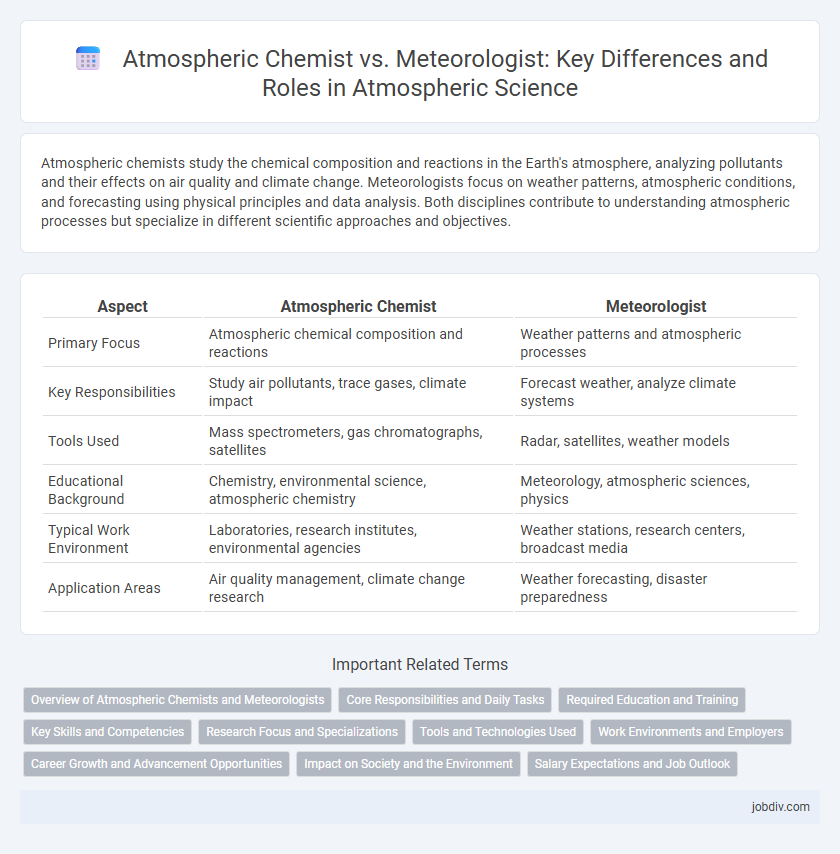Atmospheric chemists study the chemical composition and reactions in the Earth's atmosphere, analyzing pollutants and their effects on air quality and climate change. Meteorologists focus on weather patterns, atmospheric conditions, and forecasting using physical principles and data analysis. Both disciplines contribute to understanding atmospheric processes but specialize in different scientific approaches and objectives.
Table of Comparison
| Aspect | Atmospheric Chemist | Meteorologist |
|---|---|---|
| Primary Focus | Atmospheric chemical composition and reactions | Weather patterns and atmospheric processes |
| Key Responsibilities | Study air pollutants, trace gases, climate impact | Forecast weather, analyze climate systems |
| Tools Used | Mass spectrometers, gas chromatographs, satellites | Radar, satellites, weather models |
| Educational Background | Chemistry, environmental science, atmospheric chemistry | Meteorology, atmospheric sciences, physics |
| Typical Work Environment | Laboratories, research institutes, environmental agencies | Weather stations, research centers, broadcast media |
| Application Areas | Air quality management, climate change research | Weather forecasting, disaster preparedness |
Overview of Atmospheric Chemists and Meteorologists
Atmospheric chemists study the chemical composition and reactions within the Earth's atmosphere, focusing on pollutants, greenhouse gases, and atmospheric particles that influence climate and air quality. Meteorologists analyze weather patterns, atmospheric phenomena, and climate trends using data from satellites, radar, and models to forecast weather and understand atmospheric dynamics. Both professionals collaborate to assess environmental impacts, improve climate models, and contribute to atmospheric science research.
Core Responsibilities and Daily Tasks
Atmospheric chemists analyze the chemical composition and reactions within Earth's atmosphere, focusing on pollutants, greenhouse gases, and their impact on air quality and climate change. Meteorologists study weather patterns and atmospheric dynamics to forecast weather and understand climate systems using data from satellites, radar, and weather stations. While atmospheric chemists conduct laboratory experiments and develop air quality models, meteorologists primarily interpret meteorological data and create weather prediction models.
Required Education and Training
Atmospheric chemists typically require a strong foundation in chemistry and environmental science, often obtaining a bachelor's degree in chemistry or atmospheric science followed by a master's or Ph.D. specializing in atmospheric chemistry. Meteorologists generally pursue degrees in meteorology or atmospheric science, with a focus on physics, mathematics, and computer science for weather prediction and climate modeling, often earning a bachelor's degree and advancing to graduate studies for research or specialization. Both professions demand rigorous education, hands-on laboratory or fieldwork, and training in data analysis, but atmospheric chemists emphasize chemical processes in the atmosphere while meteorologists concentrate on weather systems and forecasting techniques.
Key Skills and Competencies
Atmospheric chemists possess advanced analytical skills and expertise in chemical processes within the atmosphere, enabling them to study air quality, pollution, and chemical reactions affecting climate change. Meteorologists demonstrate strong competencies in weather prediction, data modeling, and atmospheric dynamics, utilizing tools like radar, satellites, and numerical weather models. Both professions require proficiency in data analysis, critical thinking, and interdisciplinary collaboration to address environmental and climatic challenges effectively.
Research Focus and Specializations
Atmospheric chemists specialize in studying chemical compositions and reactions within the Earth's atmosphere, focusing on pollutants, greenhouse gases, and their impact on air quality and climate change. Meteorologists concentrate on weather processes, atmospheric dynamics, and forecasting, analyzing temperature, humidity, wind, and precipitation patterns. Research in atmospheric chemistry often involves laboratory and field experiments to understand atmospheric reactions, while meteorology relies heavily on numerical models and satellite data to predict weather events.
Tools and Technologies Used
Atmospheric chemists utilize advanced spectrometers, gas chromatographs, and mass spectrometers to analyze air composition and chemical reactions in the atmosphere. Meteorologists rely on Doppler radar, weather satellites, anemometers, and numerical weather prediction models to monitor and forecast weather patterns. Both fields integrate remote sensing technologies and supercomputing for data analysis but apply them to different aspects of atmospheric science.
Work Environments and Employers
Atmospheric chemists typically work in research institutions, universities, and government laboratories specializing in air quality and pollution studies, often collaborating with environmental agencies. Meteorologists are commonly employed by weather forecasting services, media outlets, aviation companies, and military organizations, focusing on weather prediction and climate monitoring. Both professions may operate in field stations, but atmospheric chemists emphasize laboratory analysis while meteorologists prioritize real-time data acquisition and modeling.
Career Growth and Advancement Opportunities
Atmospheric chemists often experience career growth through specialization in air quality research, environmental policy development, and laboratory analysis, with opportunities in academia, government agencies, and private sector firms focused on pollution control and climate change. Meteorologists advance by gaining expertise in weather forecasting models, climate prediction technologies, and operational meteorology, leading to roles in broadcast media, national weather services, and emergency management organizations. Both fields benefit from ongoing technological advancements and interdisciplinary collaborations, but atmospheric chemists typically engage more in research-driven career paths, while meteorologists often pursue applied forecasting and public communication roles.
Impact on Society and the Environment
Atmospheric chemists analyze the chemical composition of the atmosphere to understand pollution sources, air quality, and climate change, providing critical data for environmental policies and public health initiatives. Meteorologists focus on weather patterns and climate forecasting, aiding in disaster preparedness and agricultural planning to mitigate societal risks. Both play vital roles in advancing climate science and protecting ecosystems, but atmospheric chemists contribute more directly to addressing air pollution and its health effects.
Salary Expectations and Job Outlook
Atmospheric chemists typically earn salaries ranging from $70,000 to $110,000 annually, driven by their expertise in analyzing air quality and chemical composition in the atmosphere. Meteorologists have a slightly broader salary spectrum, averaging between $60,000 and $100,000, with variations based on roles in forecasting, research, or broadcast meteorology. Job outlook for atmospheric chemists is projected to grow around 6% due to increasing environmental concerns, while meteorologists face a growth rate of approximately 8% fueled by demand for advanced weather prediction and climate modeling.
Atmospheric Chemist vs Meteorologist Infographic

 jobdiv.com
jobdiv.com